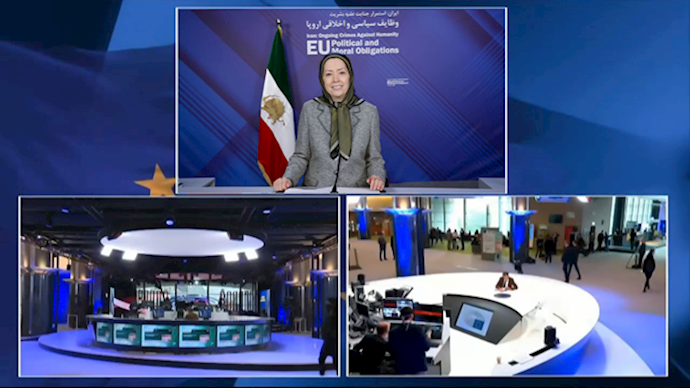Reporting by PMOI/MEK
Iran, October 7, 2020—On Wednesday, dozens of Members of the European Parliament participated in a virtual conference to discuss Iran policy and relevant “political and ethical obligations” for Western powers. The event was the latest in a series of virtual gatherings discussing the correct global policy vis-à-vis Iran. The MEPs condemned the horrific human rights violations witnessed on a daily basis across Iran and called on the European Union to put aside its failed policy of appeasement. It is high time to stand alongside the Iranian people and support their justified aspirations for a free, democratic and non-nuclear Iran.
Maryam Rajavi, the president-elect of the National Council of Resistance of Iran (NCRI), was the keynote speaker of the event.
“The mullahs’ inhuman policies are surprising for some people. Why do they execute a young national champion, Navid Afkari, despite global and domestic protests? Why do they target airports, oil installations and oil tankers? And why don’t they give up their nuclear and missile programs, or their criminal wars in the Middle East?” Mrs. Rajavi said in her opening remarks. Rajavi also highlighted how the appeasement policy has failed to rein in the malign behavior of the Iranian regime:
“Years ago, the European Troika experienced human rights dialogue, critical dialogue, and constructive engagement with this regime. The outcome of each of these policies was just disastrous. The [Joint Comprehensive Plan of Action] also led to nothing but reinforcement of the IRGC, further suppression of the people of Iran, more warmongering in Syria, Iraq, and Yemen, and more terrorism in Europe and other countries.”
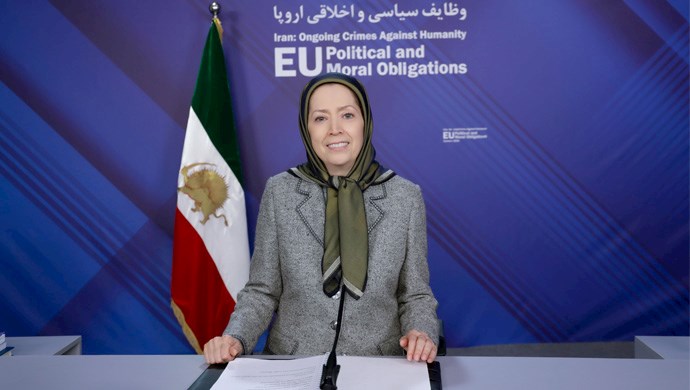
Iranian opposition NCRI President-elect Maryam Rajavi
Why has the regime become so emboldened in its terrorism? “One reason is that the regime is desperate in the face of the Iranian people’s protests and the significant role of the Iranian Resistance in the uprisings,” Madam Rajavi said. “But another reason is that the regime was confident that it would not pay any price for committing such major terrorist crime in the heart of Europe, due to the ongoing policy of appeasement.”
In her speech, Mrs. Rajavi also made policy recommendations. “On behalf of the Iranian people’s Resistance, I propose a policy with three elements: Human rights for the people of Iran, comprehensive embargo of the religious dictatorship, and recognition of the Iranian people's Resistance for freedom and democracy,” she said. “I urge the Parliament of Europe to urge the Council of Ministers to adopt a binding legislation, to expel the Iranian regime’s agents from the European soil, shut down the regime’s embassies in all EU member states, and designate the IRGC and its proxies in Iraq, Syria, Lebanon, Yemen, and other countries as terrorist groups.”
Rajavi also called for an independent international mission to investigate the massacre of 30,000 political prisoners in Iran, the slaughter of more than 1,500 protesters during the November 2019 uprising, and the conditions of prisons and prisoners in Iran, particularly the political prisoners.
“We demand the release of all political prisoners,” Madam Rajavi concluded.
Accordingly, a number of participating MEPs expressed dissatisfaction with European leaders’ perceived tendency to over-emphasize Iran’s nuclear program and seven-party talks that concluded in 2015.
The MEPs talked about the nuclear deal with its capacity for overshadowing other topics that have only grown more important in the years since the Joint Comprehensive Plan of Action went into effect. Among these are the Iranian regime’s human rights violations and its penchant for both financing and directly facilitating terrorism throughout the world. Wednesday’s conference noted that both categories of malign activity seemingly accelerated in 2018, following the nationwide anti-government uprising by the Iranian people.
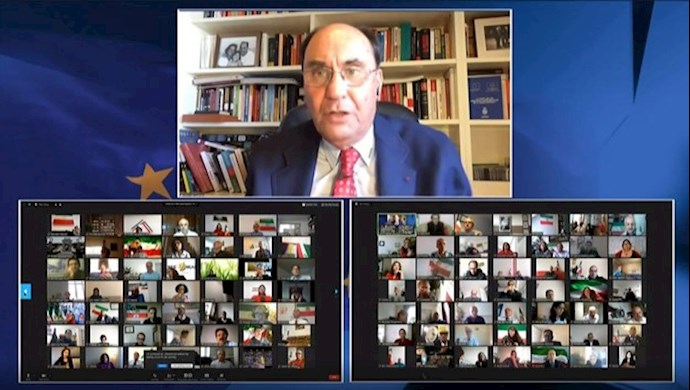
Alejo Vidal Quadras, former vice-president of the European Parliament from 1999 to 2014
“We all have a very serious concern about the inaction of the EU and the High Representative. The two recent cases of political prisoners Navid Afkari and Mostafa Salehi are of concern,” Alejo Vidal Quadras, former vice-president of the European Parliament, said in his speech. “The EU did nothing. They waited until they were executed, and then they tweeted their condemnation. Navid and Mostafa could have been alive today if the EU and Member States had taken concrete actions to stop these murders.
“Why do the EU and UN stay silent on the savagery of the Iranian regime? To save the nuclear deal? At the price of people’s lives in Iran? Does the nuclear deal deserve bloodshed?
“The Iranian people have the right to protest according to the UN Charter. Where are our European principles? How can European leaders look into the eyes of Iranian people who are suffering under tyranny and just do nothing? Can they look into the eye of the children of Mostafa Salehi and tell them they did nothing while their father was being hanged?”
Wednesday’s conference also pointed to the 2018 uprising and subsequent protests as a prominent reason to re-frame those discussions, and to specifically explore the possibility of coordinating with an organized Iranian Resistance movement as part of a strategy to undermine the full range of Iran’s malign activities.
“The EU is at a crossroad. Elected officials at various EU institutions and national governments can no longer delegate their responsibilities for making meaningful decisions to those who fail to realize the true nature of this regime both internally and externally. The EU must stand with the Iranian people and their democratic alternative, the National Council of Resistance of Iran under the leadership of Maryam Rajavi,” Stanislav Polčák, MEP from Czech Republic, said.
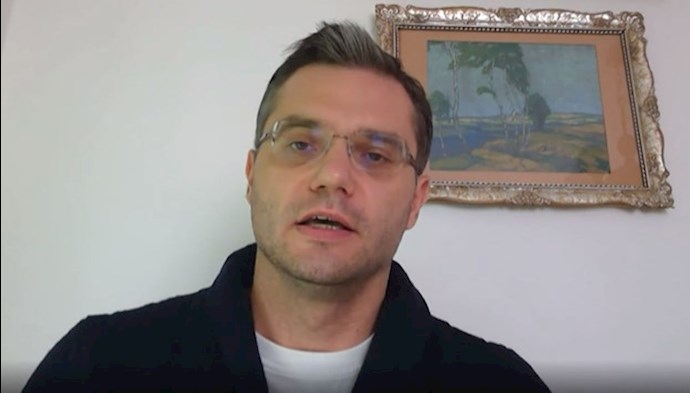
Stanislav Polčák, MEP from Czech Republic
The conference renewed the calls-to-action that have previously been issued by a number of political groups within the European Parliament and the governments of various EU member states. Supporters of the Iranian Resistance view the international community as having a responsibility to fully investigate the 1988 massacre and ongoing rights abuses of the regime, and confirm the involvement of leading regime officials such as judiciary head Ebrahim Raisi, and recommend charges for human rights violations at the International Criminal Court.
“Political prisoners are easily killed under torture. In its latest report, Amnesty International speaks about an ‘epidemic of torture’ in Iranian prisons. Torture is a routine matter in in all detention centers and prisons whether of the security forces or the Intelligence Ministry or in the IRGC. There is no law and no due process. Everything is arbitrary. As recently revealed by the NCRI, there are secret and unknown torture centers where the torturers can do anything they want with full impunity. This is why it is so vital to put pressure on the regime to open the gates of its dungeons to an international fact-finding mission,” Gianna Gancia, MEP from Italy, said in her speech. “I insist that this is an obligation of the EU. With such revealing reports, the situation of the political prisoners is not an internal matter. It is truly an international matter. If today there are European dual citizens taken as hostages in Iran, it is because the EU did not speak with the regime in the right language of firmness. If today the EU does not respond to Mrs. Rajavi’s call, there is no doubt the regime will take more hostages from us and then it will be too late to do anything.”
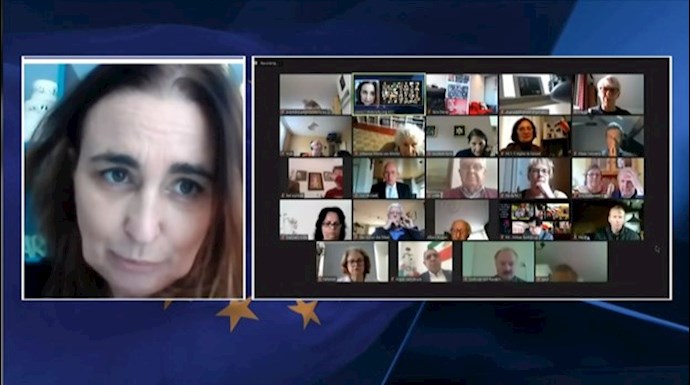
Gianna Gancia, MEP from Italy
The MEPs on Wednesday cited Tehran’s desperate crackdowns at home and abroad as evidence that the regime is in a more vulnerable position than it has been willing to acknowledge.
The central conclusion expressed by participants in Wednesday’s conference was that European governments ought to adopt more assertive policies for dealing with Iran. And those policies, they said, should be executed in coordination both with the United States and with Iran’s domestic activist community.
“Human rights should not be seen as a secondary issue which can be overlooked when trying to save the JCPOA or other agreements with this tyrannical regime. Human rights should come first,” Ivan Štefanec, MEP from Slovakia, said. “Our European democratic principles demand that the EU takes the lead in defending the Iranian people’s human rights and protesting against the regime for its atrocities. We cannot use soft language to call for restraint when the repressive regime was killing the impoverished protesters in the hundreds during the November 2019 protests in Iran. There is no way that the appalling human rights situation will change if there is no independent investigation and accountability. This is the kind of policy and action we expect to see from the EU.”
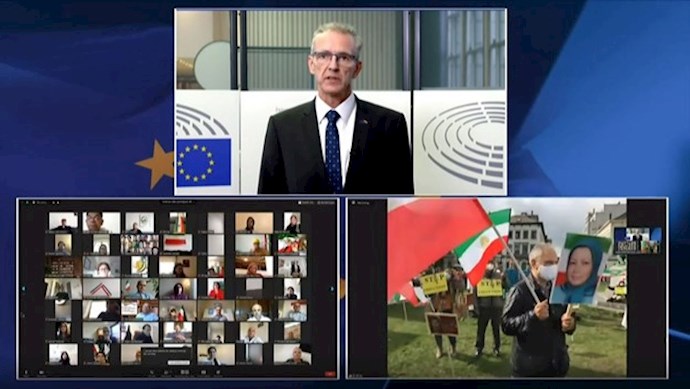
Ivan Štefanec, MEP from Slovakia


